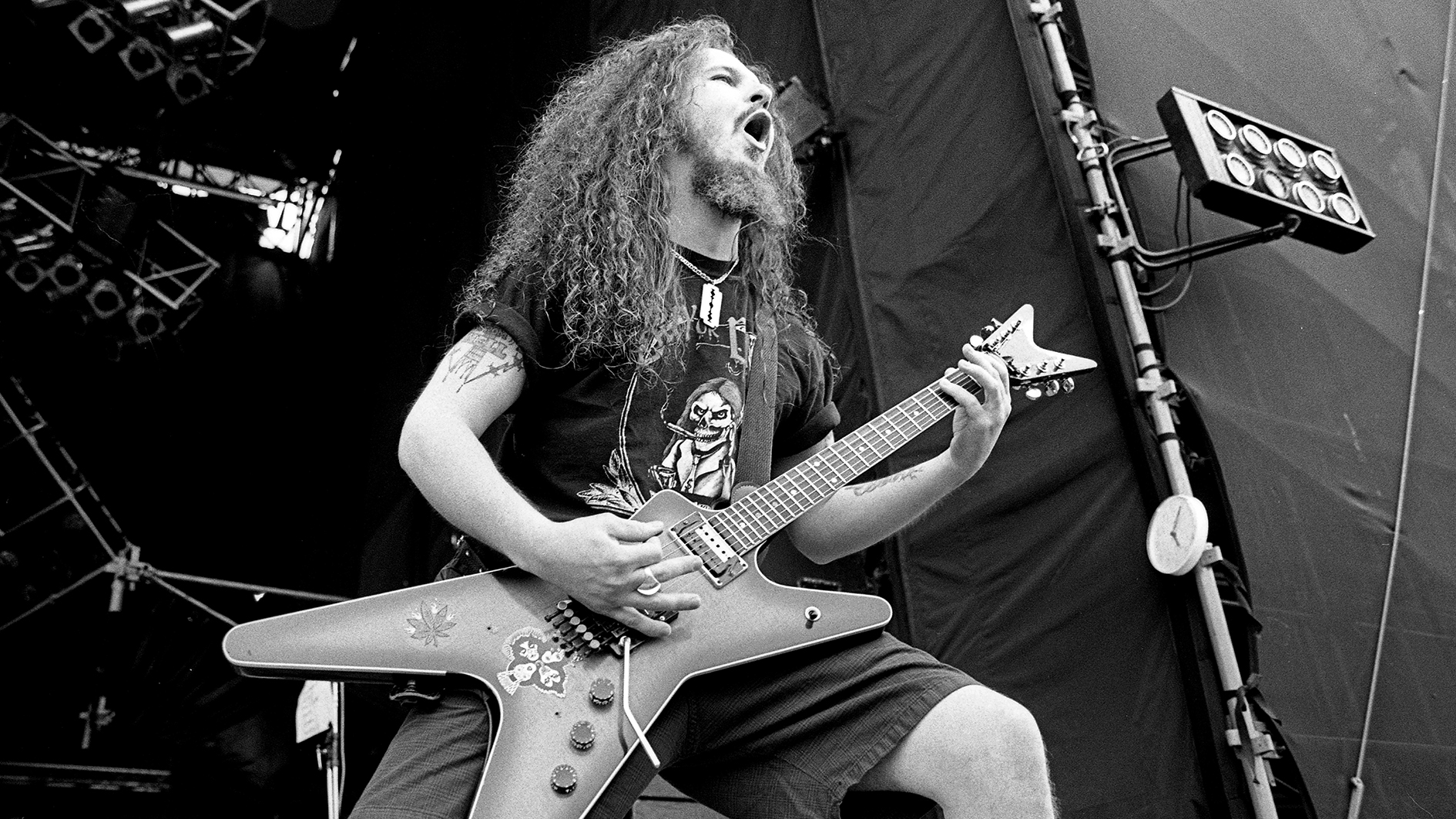Dimebag Darrell reveals his 12 favorite metal tracks in this classic 1993 Guitar World interview
The legendary Pantera guitarist shares the top heavy-hitting tunes every guitarist should know

This Prime Cuts feature is from the March 1993 issue of Guitar World. The original headline was "Diamond Darrell's Dirty Dozen."
Pantera's six-shooting Texas tornado pumps up his 12 favorite hair-raising, fist-pumping metal classics that every self-respecting guitarist should know.
You won't find a shred of jazz, blues, classical, country, funk or alternative guitar playing on any of Pantera's six albums, including their recent breakthrough efforts, Cowboys from Hell and Vulgar Display of Power. What you will hear is plenty of metal – mean, ornery metal, in the great headbanging spirit of the genre's forefathers.
Leading the Texans' assault is guitarist Dimebag Darrell, who spent his early years carefully studying platters by metal's most respected giants: from Black Sabbath and Judas Priest to Iron Maiden and Van Halen.
"The harder stuff has always done it for me," said Darrell. "Man, if it rips, I'll give it a thumbs up!"
At Guitar World's request, the guitarist compiled a list of 12 tunes he regards as pivotal to his development as a player.
After he'd completed his list, Darrell commented, "One thing holds true for each of these bands: They all jammed. If kids today want to put a band together and kick some serious ass, it's important for them to go back and check out these songs, because, when it comes to metal, it doesn't get any better than this."
Get The Pick Newsletter
All the latest guitar news, interviews, lessons, reviews, deals and more, direct to your inbox!
1. Ozzy Osbourne – Crazy Train
Album: Blizzard of Ozz (1981)
Guitarist: Randy Rhoads
"The first time I heard Crazy Train I was crashed out in bed, definitely not wanting to get up and go to school, when my brother Vinnie Paul came in and cranked it up.
"I heard that opening bass line and Ozzy going 'I-I-I-I,' then Randy coming in with that classic riff. That song just busted me in the ass. I was out of bed, dressed, and in school-on time for the very first time! Randy played a lot of cool slurs, where he would slide his pick down the top E string, and I definitely picked up on that."
2. Judas Priest – Rapid Fire
Album: British Steel (1980)
Guitarists: Glen Tipton, K.K. Downing
"Glen Tipton and K.K. Downing are the gods of double-guitar axemanship.
"They almost fit into the Jimmy Page mold as classic guitarists. Again, they had great tones and unique styles. And I love those quick little fill leads in Rapid Fire. A lot of the guitarists we're talking about weren't just great lead players, but were real band-oriented players. And that's how I approach playing in Pantera."
3. Deep Purple – Smoke on the Water
Album: Machine Head (1972)
Guitarist: Ritchie Blackmore
"You don't need to say much about that song. It's the ultimate simple tune; it was actually the first song I ever learned. I learned it on the E string, then my dad taught me a chord and I thought it was as heavy as shit. It's simple, but totally bad-ass. It proves that you can play three notes and still make it killer."
4. Def Leppard – Rock Brigade
Album: On Through the Night (1980)
Guitarists: Steve Clark, Pete Willis
"Man, that first Leppard album really jams, and their original guitarist, Pete Willis, was a great player. I was inspired by him because I was a small young dude and he was a small young dude, too – and he was out there kickin' ass. He made me want to get out there and play. Def Leppard used the two-guitar thing much more then than they do now."
5. Black Sabbath – Children of the Sea
Album: Heaven and Hell (1980)
Guitarist: Tony Iommi
"We used to play that song live. The acoustic intro has some great dynamics, and then Tony kicks in with this simple but hard riff, kind of like Smoke on the Water. Iommi had a monstrous guitar sound on that album. And he had that skidding vibrato technique that was so quick and killer. He hardly ever does a slow vibrato. He started all that de-tuning stuff, which I really learned from him."
6. AC/DC – Beating Around the Bush
Album: Highway to Hell (1979)
Guitarists: Angus and Malcolm Young
"I can't say enough good shit about Angus' playing. He really stands out from other players. He has a very original guitar sound, and a killer vibrato. He plays totally clean, like he's playing through a Marshall on 12 without the gain kicked in – it's pure distortion, not fuzzy. Beating Around the Bush highlights all of that."
7. Iron Maiden – Children of the Damned
Album: The Number of the Beast (1982)
Guitarists: Adrian Smith, Dave Murray
"Both Smith and Murray are real bad-ass players. Both have that rhythm pickup tone happening, and the Children of the Damned lead really shows that. They don't play too fast, but they play choice notes and work great together. And they have great tones. They also had the ability to play delicate acoustic stuff when they wanted, and could shred with the best when it was appropriate."
8. Kiss – Shock Me
Album: Love Gun (1977)
Guitarists: Ace Frehley, Paul Stanley
"Ace is god, and the Shock Me solo is killer. The studio version has so much production just in the lead section. I also love the effects on it, especially the phaser on the last note. Man, I get all wound up just talking about Kiss! Ace's vibrato is what really grabbed me, and I always try to apply that to my playing. He could squeeze so much out of a single note that one note could take the place of 12."
9. Metallica – Motorbreath
Album: Kill 'Em All (1983)
Guitarists: James Hetfield, Kirk Hammett
"I love Hammett's lead playing, but Hetfield's rhythm playing is truly phenomenal.
"He's the god of chugging riffs, and Motorbreath is a good example of tight, chunky, galloping speed playing. Man, when I first heard that song, I didn't know what it was! It was so heavy, but real clean. That song really taught me how to play clean, driving rhythms. I don't know any guitarist that can down-pick like Hetfield, and Motorbreath is a prime example of his expertise."
10. Slayer – At Dawn They Sleep
Album: Hell Awaits (1985)
Guitarists: Jeff Hanneman, Kerry King
"Those guys have a real unorthodox style of playing – it's totally not normal [laughs]. They have unbelievable rhythm chops. Their songs taught me how to play with guts and aggression.
"The half-time feel on At Dawn They Sleep is really cool, too. I like how they just start and stop out of nowhere, using no time to build up or wind down. They never give you a chance to get into a song: as soon as it starts, they're battering you over the head, hard and fast.''
11. UFO – Lights Out
Album: Lights Out
Guitarist: Michael Schenker
"This song is played in F#, my favorite key to wail in. It's like E – it's real common, but you can't beat it. You can write every song on an album in E and not hurt a thing. Your straight E to F# is pure power, and playing leads in F# is awesome because you can do it down in the second fret position. Tunes like Lights Out showed me how to do that.
"The rhythm section behind the lead in that song is really driving – it's fire, it's guts, it's live, it's totally jamming! We try to maintain that in Pantera. Even though we don't use a rhythm guitar track behind my leads, Rex and Vinnie keep things going when I solo – like a rhythm section lead behind my lead."
12. Van Halen – Eruption
Album: Van Halen (1978)
Guitarist: Eddie Van Halen
"Van Halen was a huge influence on me, and Eruption was the song that really leaped off that first Van Halen album.
"I was a little kid when I first heard it, and I couldn't believe how Eddie just ripped the strings off his guitar. He played with a fierce aggression – and his guitar sound was unbeatable. That dive bomb sound effect at the song's end sounded like the world was coming to an end. Because Eddie was so hardcore about his guitar, he made me look at the instrument in a different way – more as a tool to screw around with than something you must play very carefully."
EDITOR'S NOTE: Although the original 1993 GW story promised 12 songs, there actually were 13 songs in the piece. Here's the bonus 13th song:
13. ZZ Top – Tush
Album: Fandango! (1975)
Guitarist: Billy Gibbons
"I'm not a super blues player, but I was exposed to the Texas blues sound while I was growing up, and that definitely rubbed off on me.
"To me, blues is more of a feel and a vibe, rather than sitting there and saying, 'Well, I'm gonna play bluesy now.' And Billy definitely plays with feeling on Tush. My favorite thing about it is where he lets that one note ring out until it dies off, then gets that rattling noise on the frets."
As a teenager, Jeff Kitts began his career in the mid ’80s as editor of an underground heavy metal fanzine in the bedroom of his parents’ house. From there he went on to write for countless rock and metal magazines around the world – including Circus, Hit Parader, Metal Maniacs, Rock Power and others – and in 1992 began working as an assistant editor at Guitar World. During his 27 years at Guitar World, Jeff served in multiple editorial capacities, including managing editor and executive editor before finally departing as editorial director in 2018. Jeff has authored several books and continues to write for Guitar World and other publications and teaches English full time in New Jersey. His first (and still favorite) guitar was a black Ibanez RG550.
“I use a spark plug to play slide. It's a trick Lowell George showed me. It gets incredible sustain – metal on metal”: In the face of sexist skepticism, Fanny's June Millington carved a unique six-string path, and inspired countless players in the process
“There’d been three-minute solos, which were just ridiculous – and knackering to play live!” Stoner-doom merchants Sergeant Thunderhoof may have toned down the self-indulgence, but their 10-minute epics still get medieval on your eardrums


![A black-and-white action shot of Sergeant Thunderhoof perform live: [from left] Mark Sayer, Dan Flitcroft, Jim Camp and Josh Gallop](https://cdn.mos.cms.futurecdn.net/am3UhJbsxAE239XRRZ8zC8.jpg)








